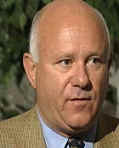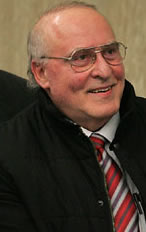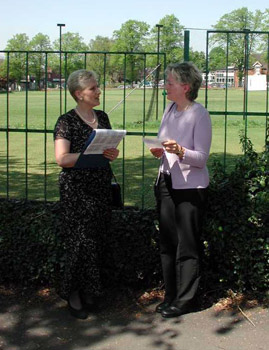The release of a supposedly independent report on the teaching of the Holocaust is the latest triumph of twistspeak in Tony Blair's Britain.
Academic, journalistic and political comment (as we have come to expect) immediately seized on the report, funded by the government but produced by the Historical Association, as the latest evidence of an Islamic threat to British values.
On the other side of the Atlantic, neoconservative columnist Cal Thomas presented the report as evidence of what he called the "surrender syndrome":
Everywhere one looks in Europe there are signs that free people are prepared to surrender without a fight to those who would place them in bondage.
In England, a new government-backed study has found that British schools are dropping the Holocaust from history lessons. Teachers are afraid to teach about the Nazi atrocity because Muslim students might take offense.
...The sacrifice of truth in favor of propaganda for fear of violence is the first step on the road to enslavement.

Cal Thomas receiving the Ben Hecht Award
for Outstanding Journalism from the
Zionist Organization of America
Another staunch transatlantic Zionist moved to comment was Canadian National Post columnist George Jonas, who suggested that in 21st century Britain what he calls "Islamo-fascism" was forcing the Holocaust into the type of "memory hole" predicted by George Orwell in 1984. Jonas concluded his article with the bizarre comment that:
British historian David Irving was jailed recently in Austria for denying the Holocaust. He may yet be jailed in his own country for not denying it enough.
If he wishes to be seen as a defender of robust and impartial history, Mr Jonas must hope that we have consigned his own past to the memory hole. His 1984 book Vengeance used the supposed evidence of a single anonymous source, whom Jonas named "Avner", to tell the supposedly true story of a Mossad hit squad tracking down and killing the PLO's "Black September" group responsible for the attack on Israeli athletes at the 1972 Munich Olympics.

George Jonas (above) and
Yuval Aviv, the real "Avner" (below)

Jonas's book became a bestseller and was later used as the basis for the Steven Spielberg film Munich. The only trouble was that Jonas's sole source, the supposed Mossad assassin and superspy "Avner", was in reality Yuval Aviv, a humble New York gate guard for the airline El Al, who had failed his basic training as an Israeli commando.
British neoconservatives also defended the supposedly impartial traditions of Holocaust pedagogy. Chris McGovern, an adviser on history teaching to the previous Conservative government of John Major, said without intentional irony that
History is not a vehicle for promoting political correctness.
In fact no less a figure than Alan Johnson, Secretary of State for Education and a candidate for Labour's deputy leadership, insisted in February this year that the Holocaust would remain an "untouchable element" of the school curriculum.
Careful examination of the report shows that it does indeed raise issues of truth, propaganda and political correctness, but perhaps not the ones that the neocon brigade have in mind.
The first thing to note is that although almost all media reaction focused on Holocaust teaching, the 48-page report, titled Teaching emotive and controversial history, supposedly had a much wider remit.
On page 7 there is even a statement with which we can all (I hope) agree, but which unfortunately is contradicted later:
Almost more than any other aspect of study, the idea that there is no one universal version of history and that history itself is not a product waiting to be caught in a net is vital if pupils are to discuss emotive and controversial issues in any depth. If explicit attention is not paid to this aspect, students also find it hard to understand the idea of significance. ...Pupils also need to appreciate the complexities that contribute to the production of a later interpretation of earlier events, such as the view of the author of an original source and the view of the group or person using the source to compile an account. In addition, the reader or viewer also brings their own ideas in understanding an historical interpretation.
Developing this encouraging note, the authors continue:
...progression in historical understanding is characterised by a growing uncertainty as one realises that there is, at best, likelihood rather than definites. ...Success is much more likely when [students] are encouraged to imagine issues from different perspectives and viewpoints, seeing much of what happened as far from clear-cut with contemporaries often viewing things as confusing, uncertain and without the benefit of hindsight.
And with specific reference to the Holocaust, page 17 of the report acknowledges that
addressing emotive and controversial history effectively requires an understanding of student misconceptions. Without this awareness of misconceptions about events such as the Holocaust, appropriate learning strategies are rendered impossible. Students often bring misconceptions and stereotypes with them. For example, in relation to the Holocaust, the beliefs that all Germans were Nazis, that the Nazis invented anti-Semitism, that all Jews were helpless victims and that all the victims died in gas chambers.
The sentence given most publicity comes on page 15 of the report:
...[A] history department in a northern city recently avoided selecting the Holocaust as a topic for GCSE coursework for fear of confronting anti-Semitic sentiment and Holocaust denial among some Muslim pupils.
Yet the report's authors themselves seem confused as to what form such "confrontation" of "Holocaust denial" should take:
[R]esearch literature suggests that teachers' ability to understand the process of debate and how to get pupils to discuss issues effectively is weak. For example, should the teacher take a neutral stance in a Holocaust debate that might give a false legitimacy to Holocaust denial.

Seeking to debate the Holocaust landed Ernst Zundel
with a five year jail sentence
Teachers can perhaps be forgiven this failure to understand the process of debate, since such debate is criminalised in several European countries by laws which may yet be extended to the UK.
Having given a few nods in the direction of what would, in respect of every other historical topic bar the Holocaust, be regarded as normal standards of historical enquiry and debate, the report's authors proceed to show their true colours, unembarrassed by the ensuing contradictions.
Recommendations for "well-used Holocaust resources" are exclusively drawn from exterminationist sources, including the Holocaust Educational Trust, Beth Shalom, the United States Holocaust Memorial Museum, and Yad Vashem.
Most tellingly page 32 of the report recommends a blatantly propagandist use of history lessons in relation to present day partisan politics. The report holds up Ounsdale High School in Wombourne, Staffordshire, for its exemplary teaching of the Holocaust:
The pupils are from overwhelmingly white British backgrounds with a small proportion coming from ethnic minority families. The department is involved in the new OCR Pilot History GCSE and teaches the Holocaust as the focus of the International Study Option. The local area has also seen growing activity from the British National Party and the Freedom Party. Given this political context, the department feels there is a need to teach the Holocaust in depth to tackle issues relating to prejudice and racism.

Freedom Party Cllr Sharron Edwards canvassing in Wombourne, where one local school developed its Holocaust teaching curriculum in response to her success
Once the authors have admitted their propagandistic intent, they abandon the pretence of even handedness altogether on page 34:
Other research into methods... suggests that, in the case of the Holocaust, it is unacceptable for a teacher to adopt the role of the neutral chair. It may indicate that the teacher is indifferent to the event being discussed or could result in revisionist, anti-Semitic Holocaust denial being given an equal platform alongside mainstream historical debate.
The report includes several single page summaries of "Latest historical thinking on some emotive and controversial issues". A section on the Holocaust is written by Dr Tim Cole of Bristol University, who asserts that at Auschwitz-Birkenau
over 1 million Jews were killed by poisoned gas in 32 months. By the end of the war, Nazi Germany and their [sic] collaborators had killed around two-thirds of the pre-war Jewish population of Europe. The exact number will never be known, but historians estimate that between five and six million Jews were killed during World War II as part of an intentional extermination policy.
Dr Cole lists only two Holocaust books for reference, Holocaust. A History by Debórah Dwork and Robert Jan van Pelt, and Elie Wiesel's Night, so neither the tone of his dismissal of revisionism nor his basic factual error regarding the Tehran Conference should surprise us:
Despite overwhelming evidence to the contrary, some have queried these figures, with so-called Holocaust deniers seeking to downplay the numbers of Jews killed or the extent of Hitler's knowledge of the Holocaust, motivated by a racist extreme right-wing agenda and a desire to rehabilitate Hitler and the Nazis. Perhaps the most recent infamous case is that of David Irving, who lost the libel case he brought against the historian Deborah Lipstadt in 2000, who had accused Irving of being a Holocaust denier. Irving hit the news again in 2006 when he was imprisoned in Austria, which is one European country that has made denial of the Holocaust as being [sic] a criminal offence. The recent conference hosted in Tehran in 2007 [sic], which gave a platform to Holocaust denial, points to its importance in the Arab and Muslim world, given the perception of the links between the Holocaust and the justifications for the establishment of the state of Israel.
I assume that English is Dr Cole's first language, but would suggest that he employs proof readers to check his submissions if he is employed on any future official reports.
The Historical Association's report does indeed suggest, as Chris McGovern feared, that history teaching is misused as a vehicle for political correctness.
And we can all agree with Cal Thomas that "the sacrifice of truth in favour of propaganda for fear of violence is the first step on the road to enslavement."
But the politically correct propaganda line which enslaves us is not the mythical fear of offending Muslims, who in fact are demonised at every opportunity in Tony Blair's Britain.
The reality is that even in Britain we are forced to sacrifice truth in favour of propaganda where one particular historical topic is concerned - the Holocaust.
As the recent jailing of Ernst Zündel and Germar Rudolf has shown, we certainly are on the road to enslavement, though Robert Faurisson's indomitable search for historical truth is a signpost towards a very different road, if we have the courage to follow it.
October 26th update: The Daily Telegraph reports that following the pilot project referred to above, the OCR is to introduce an "alternative" History A-Level to British schools from next year. But some alternatives are of course beyond the pale. The Telegraph tells us that "Historical controversies will be a key topic and for the first time, the OCR includes the issue of Holocaust denial and will teach pupils how to defend against the claims.
"According to the OCR's guidance, this will include looking at the trial of David Irving, the British historian, who was convicted of denying the Holocaust in Austria after a speech he made in 1989."